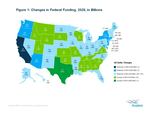Momentum in Congress is building again to take another shot at repealing the Affordable Care Act, but a new analysis shows Oregon could lose big if the latest plan gains approval.
The bill, known as the Cassidy-Graham bill — named after the sponsoring senators from Louisiana and South Carolina — would cut government health spending dramatically.
But experts think Oregon would likely take one of the biggest financial hits if the bill gains approval in Washington. That's because the state embraced Obama's health care reforms and greatly expanded Medicaid under the ACA.

Oregon would lose about $13 billion in federal funding by 2016 under the Cassidy-Graham bill, according to a study by Avalere.
Avalere Health LLC
According to a study by the left-leaning Center on Budget and Policy Priorities, Oregon would lose more than $3.5 billion over the next decade under the Cassidy-Graham Block Grant proposal.
That proposal would essentially undo major expansions of Medicaid under the ACA, and give states a lump sum of money to use as they see fit.
Only California, New Jersey, New York and Massachusettes would lose a larger total of health care dollars than Oregon under the plan.
The states that fair best under the plan are Texas, Tennessee, Mississippi, Alabama and Georgia.
The study estimated the bill would save the federal government about $80 billion dollars by 2026.
An analysis in the New York Times this week shows Oregonians face the biggest cuts per person in the nation.
A second study, by health consulting firm Avalere, has Oregon losing more than $13 billion over the next decade. And a third study by Manatt has Oregon losing more than $35 billion.
While the financial estimates differ widely, the winning and losing states generally remain the same.
Political pundits point out that health care spending drops in all but 16 states under the proposal. And that 15 of those states voted for President Donald Trump.
Louisiana Republican senator Bill Cassidy's office has done its own research. Its report says only eight states would see funding decline between 2020 and 2026, with most cuts in the 1 to 3 percent range.
But Cassidy's office uses a different baseline. It does not consider how funding would change compared to current law. Instead, it looks at how block grants would change over time.
Senate Majority Leader Mitch McConnell’s office has said he intends to bring the Graham-Cassidy bill to the floor next week.
The Congressional Budget Office has not conducted an independent analysis to estimate costs or savings of the Cassidy-Graham bill yet, and has said it would take several weeks to do so.
